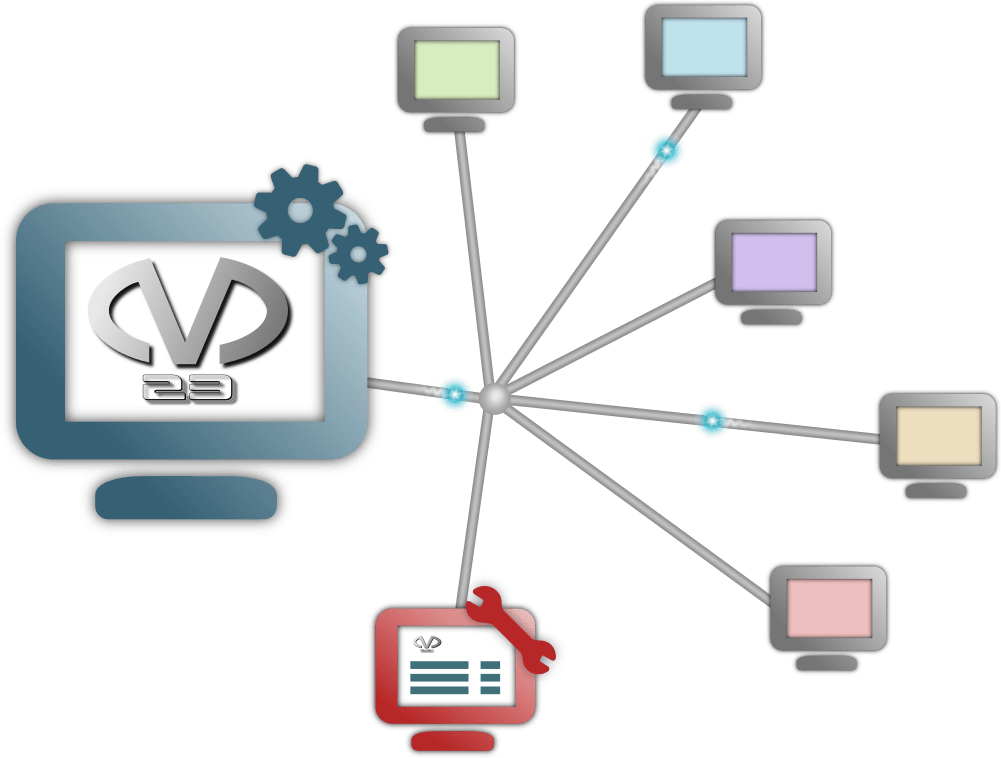
Network Deployment for Linux
Nur einen Moment... / Just a moment...
Freie Software und Bürgerrechte benötigen Deine Aufmerksamkeit!
Handeln gegen Überwachungsstaat und Softwarepatente
Wenn Du auch in Zukunft in einem Staat leben möchtest, der nicht dem Überwachungsstaat aus "1984" gleicht, und/oder Du möchtest, dass weiterhin jede(r) Software entwickeln und vertreiben kann, gibt es verschiedene Möglichkeiten, sich zu engagieren. wir möchten Dir diese fünf Organisationen empfehlen:
Free software and civil rights need your help!
Act against police state and software patents
If you don't want to live in a state à la "1984" and you want that development and distribution of software should remain legal for everyone, then you have different possibilities to get into the act. We would like to recommend these five organisations:

m23 22.1 now offers support for the recently released Ubuntu 22.04 "Jammy Jellyfish" LTS as an additional m23 client platform (including 6 preconfigured desktop environments), as well as Linux Mint 20.3 "Una" with 3 preconfigured desktop environments. Debian 11 "Bullseye" can now be used as an additional m23 server platform. In addition, there are many small changes, improvements and updates.
Ubuntu 22.04 and Linux Mint 20.3 for m23 clients, Debian 11 for m23 servers
As of this version, m23 also supports Ubuntu 22.04 LTS as an additional client distribution, including the familiar range of functions known from other distributions. Included are 6 pre-configured desktop environments: Mate, Ubuntu Desktop (based on Gnome), LXQt, Budgie, KDE and Xfce. m23 now no longer uninstalls snapd anymore, because some standard software, such as Firefox, is no longer offered as a normal package by Canonical. Additionally, m23 also supports Linux Mint 20.3 as another client distribution. Here there are three pre-configured desktop environments: Mate, Cinnamon and Xfce. And last but not least, the m23 server software can now also be installed on Debian 11.
Inclusion of a customer project
In the course of working on a customer project for a group of schools, many customized functionalities emerged that are only used within the context of this project, or which have even been "discarded". These functions are still available in the m23 API and – thanks to the open source nature of m23 – can be used in other places in future m23 versions. It is also possible to reuse them outside of a school context (e.g. in your enterprise or organization). Apart of very many functions that are only relevant within the project, there are also some that will be of interest to m23 users:
- The MAC addresses of WLAN cards present in m23 clients are now transmitted to the m23 server.
-
Using the new script
mkDebCustomSettings.sh, a package can be created that contains the settings of the current m23 server in order to import it on another m23 server. This includes /m23/data+scripts/extraDebs/*.deb, /m23/inc/schoolInfoConf.php, /m23/inc/schoolConfig.php, /m23/m23customPatch/*.m23custom, package compilations and non-standard package source lists in the im-/export. -
A call to
/m23/bin/m23cli.php indexAndSignExtraDebsrecreates the repository structure including GPG signatures under /m23/data+scripts/extraDebs, which is used by mkDebCustomSettings.sh, among others.
Updates
The Linux kernel of the m23 boot media (client network boot via PXE and ISO and m23 server installation ISO) was upgraded to version 5.10.113 and the software version to Debian 11. During the update, the initrd also had to be increased to 256 MB, but this should not be a problem with today's RAM sizes. Besides adding Debian 10 and 11, Debian 9 was removed, and dependencies were added so that building the boot media also works under Debian 11.
Other changes, improvements, corrections and other tidbits
Of course, there are also some minor and major improvements and corrections. You can find the complete list of changes in the changelog.
- On UCS, the sporadic freezing of the m23 interface should now be a thing of the past.
- Although there will probably be no more security updates for Debian 9 after 2022-06-20, there is a workaround available for m23 servers still using Debian 9, so that m23 clients with Ubuntu 22.04 can use LDAP for user authentication.
-
Before applying an m23 custom patch, the backup of the original file is now replaced by the new version, so the backup files will not accumulate anymore. The new
applyAllm23CustomPatchesscript can be used to apply all m23 custom patches stored under /m23/m23customPatch, independently from an update of the m23 package. - m23 clients that are connected to a FreeIPA server through m23 now automatically receive a client certificate. Additionally, a user's home directory is automatically created when logging in for the first time, if it does not already exist.
- The m23 server Raspberry Pi image is now based on Debian 11 in the ARM64 version instead of Raspberry Pi OS, because there were network errors under Raspberry Pi OS that could not quickly be fixed. Therefore, a 64-bit Raspberry Pi (from 2 Mod. B v1.2) is now required.
- The PHP code was adapted to the PHP 7.4 syntax. Instead of curly braces, square brackets are now used to access individual letters in a string. Also, the existence of an array element or a variable is now checked in many places before an access occurs.
- On UCS , symlinks to the m23 user manual and the m23 development guide are now created so that they can be opened via the m23 web interface.
- The MariaDB database structure of the m23 server has been adapted so that only MyISAM tables are used and all fields have a default value now.
- Packages that are installed as a dependency of m23 (e.g. various PHP packages) are now installed as a generic package without version specification (e.g. php-bz2 instead of php7.4-bz2). This means that the latest package of the respective distribution is always installed and makes it easier to update the underlying distribution when changing the major version. Adjustments in the integrated update function should now (in most cases) simplify updating to Debian 11. However, you should definitely take a look at the installation manual and the script linked there (which you of course check thoroughly before running). Also remember to make a backup of your m23 server before upgrading.
- In some places, code that is no longer needed (e.g. workarounds for Debian 3.0 or installing a KDE 3.x splash screen under current KDE versions) was removed.
- Smaller adjustments were made to m23-autoTest, the framework for automated testing m23 functions within a virtual test environment: Now m23 servers based on Debian 11 (32- and 64-bit) can be tested with the complete range of functions. Also, priority is now given to a remote graphical X session for displaying the VirtualBox windows. This is particularly practical if you have logged in to the virtualisation computer via X2go and a local Xorg session is already running there.
- The m23 API functions for editing text files on m23 clients can now also work with regular expressions.
- m23 (web interface, script generation, etc.) and the MDK (m23 development kit) have now moved to GitLab, replacing the repositories on SourceForge and GitHub.
Videos on the topic (in German)
Announcement in the Community video series "Nicht der Weisheit letzter Schluß":
Here you can find videos about m23 basics:
- m23-Server mit dem m23-Installations-ISO aufsetzen
- m23-Server über Debian-Pakete installieren
- Installation und Konfiguration eines m23-Clients
m23 app for Univention Corporate Server
The m23 app for UCS 5.0 will be released shortly, too (if it isn't yet when this news article is published).
Downloads / Update
The latest release is available as an update from the m23 interface, via apt (configuration as described in the Installation Guide), as an app for UCS, as ISO file for the creation of an m23 server installation medium, as a preinstalled virtual machine and as an image file for Raspberry Pi (the latter three can be found in the Download section).

m23 21.1 now supports the recently released Debian 11 Bullseye to be used as client platform (including 6 preconfigured desktop environments) as well asLinux Mint 20.2 Uma, which comes with 3 preconfigured desktop environments. In addition to these quite obvious changes, many changes and improvements "under the hood" made it into the new version: e.g. the option to connect a FreeIPA server to an m23 server, to make use of some FreeIPA functionality (e.g. user authentication, Kerberos, roles or user group comparison).
Debian 11 Bullseye
m23 clients with Debian 11 bring you many updated software packages and also the familiar range of installable desktop environments: Mate (optionally as minimal variant with only the absolutely necessary packages), Cinnamon, Gnome, KDE, LXDE and Xfce. 64- and 32-bit clients can be installed, with the desktop selection being independent of the system architecture.
Linux Mint 20.2 Uma
Linux Mint 20.2 Uma has been added as a client distribution, which includes the familiar range of functions from the other distributions. It comes with three preconfigured desktop environments: Mate, Cinnamon and Xfce.
FreeIPA
In addition to the added support for the new distros, the most notable change is the option to use FreeIPA in conjunction with m23. A new dialog allows you to setup your m23 server for connecting it to a FreeIPA server werden. If FreeIPA is used for an m23 client, it will be connected to FreeIPA, allowing you to use some FreeIPA functions, including user authentification, Kerberos, roles or comparison of user groups). The m23 server can then also access the data stored on the FreeIPA server, in order to add entries for users, groups, devices (hosts) and DNS configuration and to read information from it, e.g. the IP addresses used in FreeIPA. On deletion of an m23 client, the corresponding entries will be removed from from the FreeIPA server.
Reuse of a customer project
In the course of working on a customer project for a group of schools, many customized functionalities emerged that are only used within the context of this project, or which have even been discarded and superseded by new ideas and decisions. These functions are still available in the m23 API and?thanks to the open source nature of m23?can be used in future m23 versions. It is also possible to reuse them outside of a school context, e.g. in your enterprise or organization). Among those new options are the integration von FusionDirectory, the automated creation of organizational structures in LDAP, the usage of Kerberos without FreeIPA or a client add wizard dialog, where all the necessary information (e.g. user account, Linux kernel, distribution, desktop) can be entered on a single page. The m23 client would then use this information to do a full installation (with automated partioning and formatting) without any further user interaction.
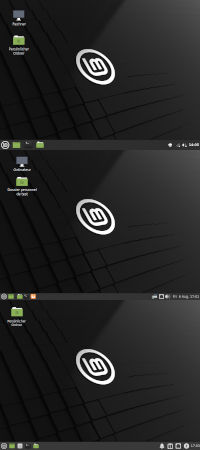
m23 autoTest
m23 autoTest, the framework for automated testing of m23 functions, has been improved in many places (e.g. the text recognition that is used to check the screen content of virtual m23 test clients) and is now compatible with VirtualBox 6.x. During refactoring, compatibility code for the old VirtualBox versions 2 and 3 has been removed and the XML test case files have been adjusted accordingly.
Further changes and small updates
- Support for a few outdated distributions (Ubuntu 16.04, LinuxMint 18 and 18.1, Ubuntu < 14.04 and Debian 6.0) has been removed from the m23 code.
- The CloudStack icon has been hidden in the server settings dialog. The corresponding m23 functions are still there, so they could be used when reactivating the CloudStack integration.
- m23 now uses the DNS server of OpenNIC as a preset in the m23 server installation ISO file, and also suggests to use it for m23 clients, when it cannot find any primary DNS server.
- All users logged in on an m23 client are now able to shut down the machine all members of the group "m23sudo" have permission to execute programs with root privileges via sudo.
- The Raspberry Pi SD card image now uses Raspberry Pi OS as of May 7th, 2021, making it compatible to the Raspberry Pi 400.
-
PHP debugging can be activated by running
/m23/bin/phpDebug, so error messages and warnings will be displayed in your webbrowser.
Bug fixes and code improvements
Of course, a couple bug fixes needed to be made, too. The cron job that deletes old package source index files is now removed upon uninstalling the m23 package. Multiple return values in m23 functions have been corrected and missing dependencies were included.
m23 app for the Univention Corporate Server
The m23 app for UCS 5.0 will be released shortly (or maybe already is released now that this news article is published). Support for UCS 4.4 has been dropped from the m23 version.
Downloads / Update
The latest release is available as an update from the m23 interface, via apt (configuration as described in the Installation Guide), as an app for UCS, as ISO file for the creation of an m23 server installation medium, as a preinstalled virtual machine and as an image file for Raspberry Pi (the latter three can be found in the Download section).
After a long time in development, including various projects for customers, we are releasing m23 20.1, which brings a lot of changes and additions. Support for Ubuntu 20.04 LTS "Focal Fossa" and Ubuntu-based Linux Mint 20 "Ulyana" for use as client distributions has been added. The update includes the usual preconfigured desktop environments. It comes with extended monitoring features and hardware support, and, as usual, also contains a range of smaller adjustments and improvements.

Ubuntu 20.04 LTS "Focal Fossa"
From this version on, m23 supports Ubuntu 20.04 LTS as a distribution for installation on the clients, including the usual feature range. It contains 6 preconfigured desktop environments: Mate, Ubuntu desktop (based upon Gnome 3), LXDE, Budgie, KDE and Xfce. m23 makes some small changes to Ubuntu, like the removal of snapd. Clients with Ubuntu 20.04 can only be installed with 64 bit architecture, as Canonical has deprecated its support for 32 bit versions.
Monitoring and configurable m23 interface
During a customer project, m23 gained a lot of new monitoring and interface options, which can be enabled / disabled and configured in the server configuration options in the m23 web interface:
- In the client overview, there are three different states now for theonline status: "Computer switched off", "System is running: No SSH and HTTPS connection" and "System is running: SSH and HTTPS commmunication active".
- In addition to this, the date and time of the last update, as well as information about delayed reboots and jobs can be included in the list.
- Monitoring information about m23 clients is periodically added to the "clientreporting" database table, while outdated entries will be removed again. The information includes the name of the m23 client, the number of packages installed on the client, its online-, update- and reboot status as well as the date and time of the last successful update.
- A duration can be indicated for each client job.
- In the menu's status area, in addition to clients with a critical status, clients that have failed to reboot within a specified time or that have failed to execute a job with a specified time will be displayed (if any). This information now also includes the group these clients are in.
- The proxy Squid, which for many years served as a Debian package cache on the m23 server, was replaced by APT-Cacher NG. APT-Cacher NG has already been in use in the m23 UCS app, and is now employed on all m23 server platforms. On updating the m23 server, Squid will be deactivated, and APT-Cacher NG will be installed and configured to cache the packages.
- The package sources list for Debian 8 Jessie has been removed. From this m23 version on, m23 can no longer install clients with Debian 8.
- Upon entering "m23quit" in one of the dialog windows in the m23 server installation program, the window will be left for a root terminal.
- Some key words that served to determine the client status using optical character recognition when installing m23 with m23-autoTest, had to be adjuste to the changed (UEFI) text mode resolutions to work reliably.
- In the recovery dialog, the client's name will be shown in the heading.
- The MDK (m23 development kit) now uses all available CPUs for compiling the Linux kernel.
- haveged, which is used to fill up the pool of pseudo-random numbers, is now halted after some time to reduce the CPU load.
- There is now an option to disable the inclusion of the package source on the m23 server in the package sources lists of the m23 clients.
- An existing EFI boot partition is no longer removed by m23, allowing to have multiple parallel operating systems installed on m23 clients. A distribution that is automatically installed by m23 will now recognize other operating systems automatically and include them into the grub boot menu.
- The X2Go server can now also be installed and configured on m23 clients with Ubuntu 18.04 and 20.04.
- phpMyAdmin was updated to version 4.9.5.
- The back function in the partitioning and formating dialog now works as expected.
- Upon saving and loading presetsn now all values are included. Previously, e.g. the package collections had been missing.
- Aside from the actual fixes to the source code, some refactoring to increase the code quality has been done. Many variables and arrays are now initialized with default values, and array elements are checked for existence before accessing them. Typing errors were fixed, deprecated PHP functions removed and some deduplication was done.
Group settings
This m23 version introduces group-scoped settings. The group settings fill the gap between the global settings and those specific for each client. Currently, they can be used to automatically reboot clients in the group, when a freshly installed or updated package is requesting a reboot.
Network configuration
When installing the m23 server using the ISO or the Debian packages, the network settings (IP address, gateway, DNS server, etc.) are being checked. If these are found to be invalid, a dialog requires you to enter correct values. This does not change the actual network configuration, but only changes how the m23 server sees its own network settings and which settings it relays to the m23 clients. These settings can be changed at runtime. This makes it possible to run an m23 server within a network that is different from the one the m23 clients are in, and to let its clients know its FQDN mitzuteilen. The SSL certificate which serves to encrypt communication between the browser and the m23 server, as well as between the server and the m23 clients, may now include the FQDN (plus an additional IP address, if desired).
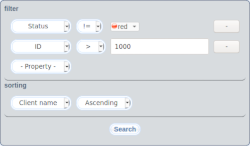
Filter-based search
The new filter-based search in the clients overview allows you to specify properties (e.g. client name, ip address, time of last change) and conditions (e.g. client ID greater than 1000). When the filter is applied, the overview will only display clients that match the criteria. Multiple filter rules can be defined and the clients' sort order can be specified.
Hardware support
The Linux kernel version used for the client (network) boot media and the server installation ISO has been updated to 5.4.34 and is configured to allow the (virtual) graphic cards of VirtualBox, Proxmox, and of some hardware, where this did not work previously, to show status information about the installation progress in UEFI mode. Display of the graphical kernel logo was disabled, because this could lead to errors displaying the terminal in frame buffer mode. Some more kernel modules have been enabled to extend hardware support during installation.
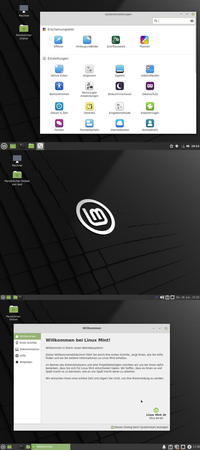
Linux Mint 20 "Ulyana"
m23 now supports Linux Mint 20 "Ulyana" for installation on clients, too, with all the usual features. This includes 3 preconfigured desktop environments: Mate, Cinnamon and Xfce. Just like for Ubuntu 20.04, the only supported system architecture is 64 bit.
More changes and small improvements
Bug fixes and refactoring
m23 app for Univention Corporate Server
The m23 app for UCS 4.4 will also be released shortly (if not already released at the time of publication of this article). Support for UCS 4.3 has been dropped from this m23 version.
Downloads / Update
The latest release is available as an update from the m23 interface, via apt (configuration as described in the Installation Guide), as an app for UCS, as ISO file for the creation of an m23 server installation medium, as a preinstalled virtual machine and as an image file for RaspberryPi (the latter three can be found in the Download section).
In quick succession to m23 19.1, which brought a lot of changes and which, consequently, took quite a long time to be developed, we now release m23 19.2 with many, yet fewer changes. m23 now supports the recently released Debian 10 Buster for use as client platform, as well as as basis for the m23 server. The new Debian-10-based Raspbian for the single-board computer Raspberry Pi can now be used for the m23 server base, too. The (beta version of) Linux Mint 19.2 Tina has been added to the list of distributions that can be installed with m23. m23 clients with Debian 10 and Linux Mint 19.2 again come with all the known preconfigured desktop environments. There was also some time left for fixes and small improvements (e.g. to m23-autoTest), most of which were needed for making m23 compatible to Debian 10.
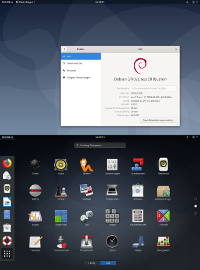
Debian 10 Buster
For m23 clients with Debian 10, the known wealth of installable desktop environments is again available: Mate (optionally as minimal variant with only the absolutely required packages), Cinnamon, Gnome, KDE, LXDE and Xfce. Clients can be installed as 32- and 64-bit variants – independently of the desktop environment.
Some adjustments to m23 were needed, to make it compatible with Debian 10:
- phpLDAPAdmin is now included in a special version which also works with PHP 7.3.
- Free IP addresses are now suggested and checked correctly on 32-bit systems again.
- The SSL certificates that protect the communication between the m23 server and its clients now contain the server's IP address in an additional attribute because wget will not accept them otherwise on Debian 10. Preexisting m23 server certificates will be updated automatically when the server is updated to version 19.2.
- A similar issue has been fixed for the GPG signatures of some package sources, which are now created in a slightly different way to be valid for the version of apt in Debian 10.
- MariaDB is now specifically configured, to reinstate the known behavior (since MySQL 3.23) on insertion of new lines into a table without indicating content for all fields.
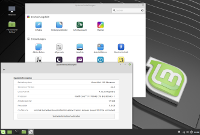
Linux Mint 19.2 Tina
From this version on, m23 includes (preliminary) support for the beta stage Linux Mint 19.2 Tina for installation on clients, with the full range of functions that is available for other distros. It comes with three preconfigured desktop environments: Mate, Cinnamon and Xfce. Clients can be installed in both 32- and 64-bit variants, independly from the selected desktop environment. As of July 19th, 2019, Linux Mint 19.2 seems to be installable with m23 without any problems whatsoever. In the case of issues popping up later, these will be corrected in a future m23 update.
m23-autoTest
There were a couple changes made to m23-autoTest, the framework for automated tests for the m23 server and clients:
- Timeouts are now dealt with correctly and lead to warnings instead of cancellation of the test.
- The new crash detection regularly checks for changes in the display content of a virtual machine. When there are no changes detected within a certain amount of time, the VM will be marked as "crashed" and the test will be aborted.
- The m23-autoTest script generator is now able to create test scripts specifically for a single client distribution where all available desktop environments will be tested.
m23 app for Univention Corporate Server
The m23 app for UCS 4.3 and 4.4 will soon (if not already) be published.
Update
The latest version is only available as an update via the m23 interface or via apt. For installing a fresh m23 server, please use the server installation packages or your preferred installation media for the previous version. A new ISO file for creating an m23 server installation medium, a preinstalled virtual machine and an image file for RaspberryPi will be available again for the next m23 version.
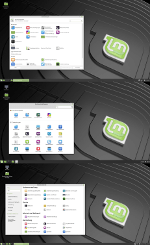
for Linux Mint 19.x
With Linux Mint 19 and 19.1, two new items were added to the list of distributions that m23 can install. For each distro, there are three preconfigured desktop environments available. In addition to these obvious changes, a lot of time was spent working on the m23-autoTest framework for automated testing of the m23 software. Other work areas include the refactoring of the MDK (m23 development kit) and lots of minor improvements. The amount of updates made to the code would easily be enough for two or three new versions of m23.
LinuxMint 19 and 19.1
From this version on, m23 supports the Linux Mint versions 19 Tara and 19.1 Tessa for installation on the clients, with the full range of functionality that users already know from other distributions included in m23. There are three preconfigured desktop environments included for Tara and Tessa: Mate, Cinnamon and Xfce. m23 can install both the 32- and 64-bit variants, leaving you the free choice among the available desktop environments, regardless of the system architecture.
m23 autoTest
This version of m23 is probably by far the most thoroughly tested version in history. This was made possible by the new m23 autoTest framework for running automated test. In countless test cycles, the framework allowed to test the combinations of m23 servers running on different platforms (Debian 9 and 8 (32 and 64bit), UCS 4.3, UCS 4.4, local m23 development system, Raspberry Pi, m23 installation ISO) with m23 clients of all supported client distributions systematically for the first time. This way, even errors were found that only occur very sporadically.
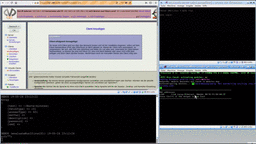
The most time-consuming development work done for creating the new version was the creation of the m23-autoTest framework for fully automated testing, end-to-end, from the m23 interface to the installation of new m23 clients in virtual machines (VMs).
m23 autoTest simulates a human administrator's behavior by making use of remote control (Selenium) for the m23 web interface. Forms in dialogs are filled in automatically to e.g. create new m23 clients, to partition and format their hard disk or to install distributions with a graphical user interface.
One test cycle includes the installation of an m23 server and of (currently) 18 m23 clients that this new server will set up. For each distribution, two clients will be installed as 32 and 64 bit variants, with randomly assigned desktop environments and alternating between German, English and French language settings.
All tests are performed on virtual machines, to ensure fast execution and good reproducibility. At various check points (e.g. notifications in the VM screen that are identified via OCR, messages in the m23 interface, or return values of commands executed in the VM), the installation status is continually monitored and evaluated. This information enables m23 autoTest to react to events with e.g. simulated key strokes or actions in the web interface of m23. In case of critical errors (e.g. server services not running), m23 autoTest can abort the current test cycle. For the ensuing analysis, the VM's screen is recorded to video, and an installation log file is being written, which contains lots of additional information when created in debug mode.
Even if the range of functionality is clearly aimed at use for m23, autoTest could still be useful for other projects. More information (about installation and configuration of the autoTest environment, how to write own XML files that describe the tests, a video recording of an automated test installation of Linux Mint etc.) is available at goos-habermann.de.
MDK (m23 Development Kit)
The MDK has been considerably improved in many sections, especially those that are used for the creation of boot media and their components:- Compiling the Linux kernel and BusyBox for 64 bit now works again on a 32 bit m23 server and vice versa.
- The built-in documentation has been updated and extended.
- During the creation of boot media for m23 clients or servers, all required libraries will now reliably be found and included.
- The software for the boot media will now be assembled from Debian 8 and 9. Package sources and packages that are available in older Debian versions only, have been removed.
- Additional notifications make it easier to spot errors.
Bug fixes
- The current time is now synced between the m23 client and the m23 server before an SSL connection is initiated. The validity period of new SSL certificates now starts on 2019-01-01. This will help avoid issues with SSL certificates that can, for example, occur in differing time zones.
- When transferring the minimal-sized distribution archive file from the m23 server to the m23 client during the tests, the m23 server in some rare cases delivered the corresponding signature file instead of the selected archive. A new routine now checks the archive client-side and retries the download if needed, until a valid archive has been transmitted.
- For the creation of a connection via HTTPs, more random values were required than were available right at the beginning. This meant that sometimes it took several minutes until the connection could be made. Using haveged allows to more quickly build a stock of random values, which vastly reduces the delay before the beginning of an installation.
- The percentage for the status bar that indicates the progress of a client installation is now calculated and displayed correctly.
- The "Change client" dialog now also works when using it multiple times in a row with different clients.
Small changes
- The "Real time client status" is now able to also display very large protocol files.
- To work around issues that occurred when fetching new tasks from the m23 server, that were caused by systemd starting the network services with a delay, the m23 server is now pinged repeatedly until it replies, and only then the task list is requested.
- The Linux kernel for the boot media was updated to version 4.9.170.
- Scripts that you make available for other users are now transferred using HTTPS.
- The hardware database is now created with an updated version of convert_hd.
- Code that was used multiple times for requesting information about the server (e.g. IP, network mask, Apache user etc.) was moved into bash scripts, that are now called from the places where they are needed.
- A new automatic partitioning scheme, which establishes partitions for system, swap and data in the first 500 Gb of a hard disk, has been added to the list of available choices.
- The backup script m23Backup now saves the IP address of the m23 server that it backs up.
- On UCS, the restoration script m23Restore will exchange all occurrances of the saved m23 server IP address by the current IP during restoration of the database.
- If the m23 client does not get assigned a valid task by the m23 server after booting from a boot medium, the client will now request information about the network settings.
- The Kerberos configuration for the clients has been adjusted, in order to also work with UCS 4.3/4.
- Many improvements on the source code were made to reduce the number of warnings in the log files.
- Error messages and warnings that occur during the installation of m23 packages (e.g. when starting server services or when recreating tables), are now logged to the file /m23/log/m23PostinstNonCriticalErrorMessages.log. These messages are not critical for m23, or are a sign of a successful previous configuration, but were sometimes causing confusion.
- The m23 web interface and the messages displayed on the clients' screens have undergone minor improvements, like now showing the correct status for packages that are marked for installation, or colorized messages during m23 client booting.
- The delay on m23 server shutdown caused by the squid proxy now lasts for maximally 5 seconds.
- Dialogs for configuring Ubuntu 18.04 packages that have debconf dialogs have been added to the m23 interface.
- m23 can no longer be used to install the expired distributions Linux Mint 17.1 Rebecca, Linux Mint 17.2 Rafaela, Linux Mint 17.3 Rosa, devuanjessie, trusty, HS-Fedora14, HS-opensuse11.4, HS-centos62, Ubuntu 12.04 Precise and Debian 7 Wheezy. When removing these distributions from m23, the corresponding debconf configuration dialogs have also been removed.
- The plugin system for extending the m23 interface from the early days of m23, which — as far as is known — is not currently being used anymore, has been removed. A replacement is available with m23customPatch since the release of m23 16.3.
- The automatical recognition of suitable graphics settings should be considerably more precise for all distributions.
- The m23 remote administration service has been removed from the menu of the m23 interface.
- A new questionnaire for sharing your m23 references has been created. A link to it is shown in the header of the German m23 web interface.
- When installing the m23 server from the m23 server installation ISO file, it is no longer attempted to install the virtualization environment. When needed, the corresponding package m23-vbox can be installed manually.
m23 clients and imaging
The options for the creation of images and for installing m23 clients from them have undergone massive changes. Features that couldn't reliably ensure a usable client have been removed during this rework.- Instead of a source MBR file now grub will always be used.
- Only partitions (and no longer complete hard drives) are available as a source and target for the image, because installing complete hard drive images frequently caused issues.
- When recovering a partition image, the file system will automatically be enlarged (if the target partition is larger than the original partition). Ext file systems will now be resized when mounted.
- partcloneWrapper is now able to recognize file systems again and will automatically choose the most suitable and most space-saving image file format.
- For compressing image files, a variant of gzip is available now that uses a less efficient compression, but works faster.
- m23 clients that are being installed from image files will only slightly be modified by m23 instead of going through a full Debian or Ubuntu configuration routine. The distribution base is automatically recognized (also works on Linux Mint) and the correct functions are called. The selection of the distribution in the m23 interface is no longer necessary (nor possible).
- The package sources lists (including /etc/apt/sources.list.d/*.list) of the m23 client are now transferred to the m23 server and will be compared to previous versions of the list. This makes it possible to install packages on imaging clients from the m23 interface.
- A new warning will be shown when the "Imaging" pseudo-distribution has been selected, as using images is the technically most challenging variant of installing an m23 client. It is not guaranteed that every image will result in a functional m23 client.
Downloads / Update
The latest version is available as an update via the m23 interface, via APT (Note: the package source server for packages specific to m23 is now "deb http://m23inst.goos-habermann.de ./". Setup as described in the installation guide), as ISO file for creating an m23 server boot medium, as a preinstalled virtual machine or as an image file for RaspberryPi (the latter three are available from the download section).





